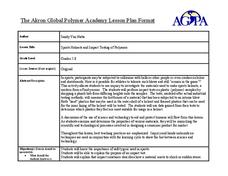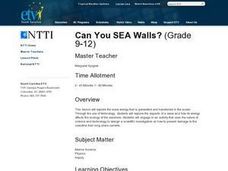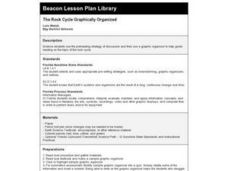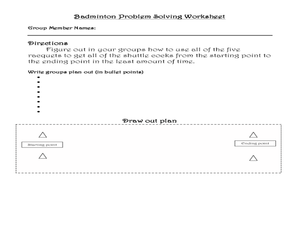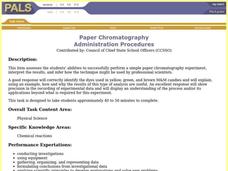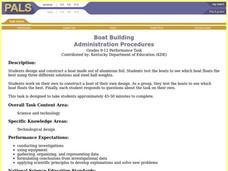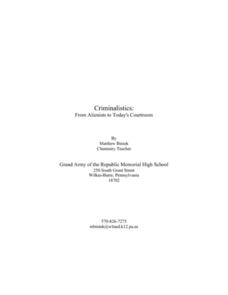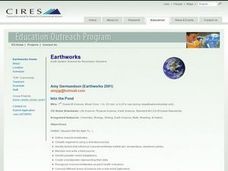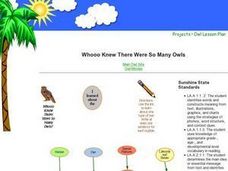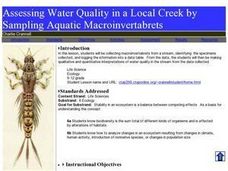Cornell University
Nano What?
The size of a nanoparticle is difficult for pupils to grasp. A hands-on experiment is designed to give your classes perspective. Learners analyze different sports drinks for the content of electrolytes as an introduction to nanoscale....
Curated OER
2105
Students read excerpts from Jon Scieszka's novel, 2095, prior to presenting their vision of the future in a creative project accompanied by written explanation. They design a museum exhibit which shows a scene from a science fiction book...
Curated OER
Genetic Engineering: Friend or Foe?
Students brainstorm and discuss ways genes can be altered, transferred and cloned. They will complete a subject sampler, opinion paper and prepare to debate their opinion on genetic engineering.
Curated OER
Sports Helmets and Impact Testing of Polymers
Students examine the importance of good quality safety gear. In this investigative instructional activity, students will tests various polymers, collect data, and analyze the data to determine which polymer is best for safety helmets....
Curated OER
Seeing in 3D: Interpreting Two-Dimensional Diagrams of Three-Dimensional Objects
Students hone in on their skills at reading diagrams. For this dimensional lesson students collect information on the functions of organs then figure out how all the parts work together.
Curated OER
Bodaciously Beautiful Butterflies Take Flight
Students complete study on butterflies using real caterpillars, keep individual daily journals of observations, and complete timeline for their caterpillar/butterfly.
Curated OER
Shake, Rattle and Roll
Sixth graders explore the causes and effects of earthquakes. They also collect and analyze data in graphs. They also use the Internet to research earthquakes
Curated OER
Can You SEA Walls?
Students explore how wave energy that is generated and transferred in the ocean. They explore the aspects of a wave and how its energy affects the ecology of the seashore. Students engage in an activity that uses the nature of science...
Curated OER
Hunting for galaxies in the Hubble Deep Field
Students examine Hubble Deep Field images. In this galaxy classification lesson, students research galaxy classification. Students view and classify Hubble Deep field images of galaxies.
Curated OER
The Rock Cycle Graphically Organized
Fourth graders use the prereading strategy of discussion and then use a graphic organizer to help guide reading on the topic of the rock cycle. They use a worksheet imbedded in this plan to guide thier inquiry.
Curated OER
Why Are Volcanoes Dangerous?
Learners investigate the causes and characteristics of volcanic eruptions including pyroclastic eruptions. They study the effects of natural disasters.
Curated OER
Color Enhanced Maps
Students download or create maps with numerical weather data. They add isolines and color to create regions on their maps. They explore the visual properties of color palettes and create a visualization applying their knowledge.
Curated OER
Cells are 3-D!
Students design three dimensional models of plant and animal cells. They identify the cells parts, and compare animal and plant cells.
Curated OER
Sports and Exercise Activity
Eighth graders practice utilizing motor skills by participating in different sports activities. In this physical education lesson, 8th graders participate in racquetball, shuttle cock, and baseball style activities in order to...
Curated OER
Paper Chromatography
Small groups of high schoolers perform paper chromatography to separate food dyes into their component colors. Students perform the experiment and collect, organize, and represent their data to form an explanation of their outcomes. High...
Curated OER
Operate and Maintain Equipment
Students are given a laboratory activity, they operate and maintain equipment according to manufacturer's recommended standards. Students are given a laboratory situation, comply with equipment safety zones according to industry...
Curated OER
Boat Building
High schoolers design and contrast a boat made out of aluminum foil. They test the boats to see which boat floats the best using three different solutions and steel ball weights. Students work on their own to construct a boat of their...
Curated OER
Science: Criminalistics - A New Look at Crime
Students examine the world of forensic science, focusing on fingerprint analysis. In the lesson, they implement a method by which fingerprints of class members are categorized and identified. Elementary students study classification...
Curated OER
Adaptations-What a Concept
Students study the pink river dolphin and how it has adapted to its environment. In this adaptations lesson students construct a map that represents certain relationships.
Curated OER
Into the Pond
Seventh graders use a pond to explore macroinvertebrates and other organisms. They use a dichotomous key to classify the organisms and maintain a journal recording their findings.
Curated OER
Whoo Knew There Were Owls
Students research information on owls using the Internet and Kidspiration. They work in groups to create a poster which includes habitat, diet and life cycle and present to the class.
Curated OER
Assessing Water Quality in a Local Creek by Sampling Aquatic Macroinvertabrets
Young scholars experiment collecting macroinvertebrates from a stream and identify the specimens collected and then log in the information into a data table. From the data, they make qualitative and quantitative interpretations of water...





